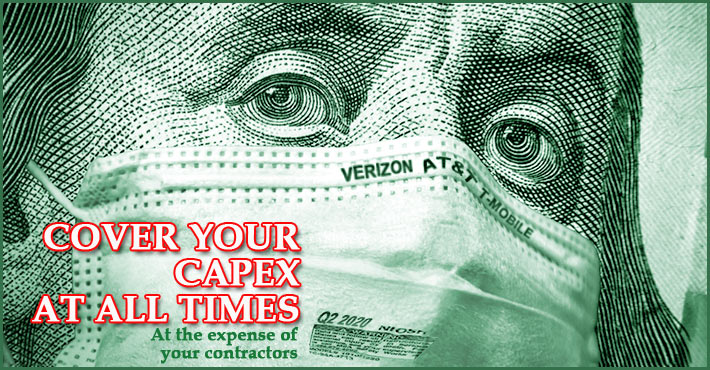
Commentary – Craig Lekutis, Editor
After an overview was published last week, of how the COVID-19 virus was affecting wireless infrastructure work conditions, dozens of updates were received by Wireless Estimator by the nation’s contractors with a key concern being their inability to obtain N95 masks, hand sanitizers and other PPE supplies.
Also, the subjective slowdown in work averaged around 30% as of yesterday due to client project delays, pulled purchase orders and companies not willing to travel lengthy distances to job sites as well as self-imposed travel restrictions.
It’s no longer business as usual
Some larger companies are prioritizing projects to their in-house crews, causing some lower-tier contractors to see a considerable slowdown. Wireless Estimator’s job tracker has seen a marked decrease in the jobs being rolled in the past week.
A primary concern of almost all contractors was their inability to be compensated for additional expenses that they are incurring due to the need to utilize additional vehicles, increased mobilization hours, and lodging increases required to maintain the Centers for Disease Control and Prevention’s social distancing requirements.
Nine companies were informed if they didn’t want to perform the work for their pre-pandemic pricing another contractor will be provided the project.
Hazard pay shouldn’t be a priority
A frequent request by workers contacting Wireless Estimator was their insistence that they should be compensated with hazard pay, especially since AT&T last week gave their field technicians a 20% pandemic pay boost and Verizon also announced an undisclosed increase in pay for their workers, extolling how they are out there on the front lines keeping their network operational during a time when it is needed now more than ever.
Illogically, three contractors who perform services directly for Verizon were informed that there would be no additional compensation for added expenses to keep Verizon’s network working – receiving a cavalier my way or the highway ultimatum.
It’s possible that both AT&T and Verizon were not being noble in increasing their workers’ pay, but were forced into it by the Communications Workers of America (CWA). CWA members should be thanked for the service they are providing but not compensated additionally.
At a time when we are all being asked to pull together – and when the economy is in decline as millions of Americans are losing their jobs every week — hazard pay is a divisive issue, especially when healthcare workers, law enforcement personnel and other first responders are truly fighting in uncharted dangerous trenches and their only reward is in their knowledge that they’re directly saving lives.
Carriers, towercos, and other infrastructure clients would better serve the industry if they apportioned part of their CAPEX to ensure that contractors are getting compensated fairly to enable them to maintain their workforce and provide a safe environment for all their personnel.
Clients have volumes of regulations to safeguard their assets and workers on their sites. It’s not uncommon for project managers to shut down a job for a safety violation, as they should.
So, why is it now permissible for them to allow four crew members to be forced to ride in one vehicle to even get out of the crew cab since it is an egregious safety violation?
Contractors’ savior will be supply and demand
NATE, WIA, and CTIA would seem like ideal trade groups that could champion contractor compensation for additional COVID-19 costs, but it’s expected that they can’t due to anti-trust regulations requiring them to refrain from bargaining for labor and wage issues.
Supply and demand will be the fuel boosting contractor revenues, safety and worker benefits this year.
The pandemic has seen federal financial faucets opened full blast for broadband and telehealth. Verizon has increased its CAPEX, the ‘new’ T-Mobile is ready to explode with work as DISH ramps up for crews in what will be a hockey stick growth cycle that will outstrip available workers.
Companies taking advantage of contractors during the pandemic will most likely be those who witness the greatest labor shortage, as they should.
Editor’s Note: If you have any industry updates or company-specific information regarding COVID-19, we would appreciate the opportunity to keep our readers abreast of them. All information will remain confidential. The infrastructure community relies upon Wireless Estimator for the most current, accurate news and research and they need it now more than ever. Please contact: CraigLekutis@WirelessEstimator.com .














